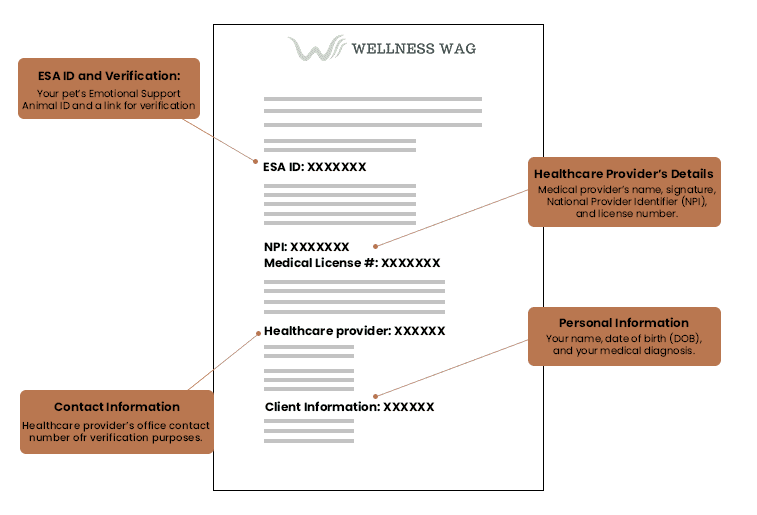Experience Our Quick and Easy Process
Experience Our Quick and Easy Process


Discover Your ESA Eligibility
Start Your Emotional Support Animal (ESA) registration by answering brief questions about your ESA requirements.

Consult with an experienced doctor
Consult a licensed medical professional for expert guidance and care.

Obtain your official esa letter
Get approved and receive your emotional support animal letter within 24 hours.
*Note: For Arkansas, California, Iowa, Louisiana, and Montana residents, newly enacted laws require individuals seeking an ESA letter to form a client-provider relationship lasting at least 30 days. This translates to having two consultations before they can qualify for the necessary documentation, resulting in a longer timeline than the typical 24 hours.
Your ESA Letter Contains the Following:
Money back Guarantee

If Your ESA Letter is not approved, we will refund 100% of your payment.

See what our happy Pet parents have to say…
Meet Some of Our Compassionate Care Team
Meet Some of Our Compassionate Care Team

Dr. Chance Miller, MD
Dr. J. Chance Miller, a native of Alabama, earned his B.A. in Spanish with minors in Biology and Chemistry from the University of Alabama at Birmingham. He was the captain of his rugby team during his time there. Dr. Miller obtained his medical degree from Columbia University College of Physicians and Surgeons in New York City, and completed his internship and at Washington University in Saint Louis.

Dr. Tasha Kornegay
Dr. Tasha Holland-Kornegay is a Licensed Professional Counselor and pet expert. She began her journey as an Animal Assisted Therapist to help her patients manage tricky, chronic mental health concerns like anxiety and depression using animals. Her expertise extends beyond traditional therapy, as she incorporates a holistic approach that considers the unique bond between humans and animals.

Dr. Stephanie White
I’m Dr. Stephanie White, a Licensed Clinical Social Worker with advanced training in counseling since 2002. Offering Teletherapy, I guide you through challenges with evidence-based care. Licensed in multiple states, including CA, NV, AK, HI, FL, and TX, I aim to promote self-sufficiency and transform lives through growth. Start your journey to better mental health today!

Dr. Joel Durinka, M.D.
Dr. Joel B Durinka, MD, a renowned Family Medicine physician in Buffalo, NY, provides personalized healthcare. With extensive medical training, he ensures tailored care, prioritizing trust and open communication. Patients receive comprehensive care, and Dr. Durinka stays updated with medical advancements. He acknowledges the benefits of emotional support animals for patient well-being.
ESA Letter Walkthrough: Your Visual Guide to Comfort and Connection
What Do I Need To Know About Emotional Support Animals


What is an emotional support animal?
An emotional support animal (ESA) provides therapeutic benefits to individuals with mental or emotional disabilities across the country. ESAs offer companionship, comfort, and support, helping to alleviate symptoms associated with conditions like anxiety, depression, and post-traumatic stress disorder. Nationwide, individuals with ESAs are protected by laws that allow them to live in housing with no-pet policies. It’s important to note that there is no official emotional support animal registration nationwide, but an ESA letter from a licensed mental health professional is usually required.
Are emotional support animals considered service dogs?
It’s crucial to understand that emotional support animals (ESAs) are distinct from service dogs. While both play essential roles in providing support to individuals, service dogs are trained to perform tasks or work directly related to a person’s disability. ESAs, including emotional support animals nationwide, provide therapeutic companionship and emotional support but are not trained to perform specific tasks.
What is the difference between an emotional support animal and a service animal?
In the United States, the primary difference between an emotional support animal (ESA) and a service animal lies in their legal recognition and access rights. Service animals, such as service dogs, are protected by the Americans with Disabilities Act (ADA) and have public access rights, allowing them to accompany their handlers in places open to the public. ESAs, however, are not granted the same access rights under the ADA and are typically not allowed in public places that do not permit pets. Even though there is no specific emotional support animal registration nationwide, an ESA letter from a licensed mental health professional can provide certain protections in housing. It’s essential to understand the specific laws and regulations regarding the rights and accommodations for service animals and ESAs in your state.

Discover Wellness Wag
At Wellness Wag, we are a team of dedicated professionals who believe in improving lives through the healing power of emotional support animals. With our extensive experience in the field, we have helped numerous individuals find tranquility, comfort, and a renewed sense of well-being through the companionship of an Emotional Support Animal.
Our goal at Wellness Wag is to offer reliable and accessible consultations for Emotional Support Animal Letters. This gives individuals struggling with emotional and mental health issues the opportunity to experience the life-changing impact of an ESA’s companionship. We are committed to providing our clients with the knowledge and resources they need to navigate this process with confidence and empathy.
Discover The Effortless Way To Get Your Legitimate ESA Letter With Wellness Wag

Complete Our Assessment
Take our quick assessment to tell us about your situation and emotional support needs, so we can tailor our services for finding an emotional support animal.

Consult With Medical Physicians
After you submit the required forms, we’ll link you with a licensed medical doctor for a personalized consultation and thorough evaluation to assess your eligibility for an ESA.

Receive Your ESA Letter
Upon confirmation by our licensed medical doctor, you’ll receive a professionally crafted ESA letter with legal recognition within 24 hours of your consultation.
We offer a unique Money Back Guarantee to ensure a stress-free experience with your pet. If, for any reason, your legitimate ESA letter doesn’t work, we will refund your money in full. Whether it’s due to non-qualification or illegal denial by your landlord, we’ve got you covered. Our policy guarantees a 100% refund for two reasons: if you don’t qualify after the consultation or if your landlord rejects the letter despite HUD complaint. Your satisfaction is our priority, and we stand behind the effectiveness of our ESA letters.
Embrace the transformative benefits of emotional support animals with ease. Choose Wellness Wag for a smooth process guided by our trusted team of medical physicians. Enjoy the positive impact of the ESA experience for you and your furry companions.
What is an emotional support animal?
An Emotional Support Animal (ESA) is an essential source of support for individuals with mental and/or emotional disabilities, providing invaluable assistance and comfort.
As awareness and understanding of mental health conditions grow, medical professionals can better diagnose previously overlooked conditions. In many cases, an ESA becomes an indispensable component of an individual’s coping process. While ESAs differ from service animals, which are trained to perform specific tasks, their impact on a person’s life can be equally significant. ESAs offer a comforting presence that helps individuals navigate their daily tasks more effectively.
It is important to note that ESAs, like service animals, are protected by state and federal laws, ensuring their rights and recognition.
Who qualifies for an emotional support animal?
Individuals with a mental or emotional disability, which encompasses conditions that significantly impact their daily lives, can benefit from having a support animal. Such disabilities may include, but are not limited to:
- Anxiety
- Depression
- PTSD
- Stress
- Personality Disorders
- Schizophrenia
- Phobias
These are just a few examples of the numerous mental or emotional challenges one might face on a regular basis. The positive impact of pets on mental health and well-being is well-established. Consequently, various mental and emotional issues can greatly benefit from the presence of a support animal.
Emotional Support Animals, Service Dogs, and Therapy Pets
Emotional Support Animals (ESAs)
Emotional Support Animals (ESAs) offer emotional support and comfort to individuals with disabilities. They do not require specific training or formal registration and play a vital role in providing assistance and alleviating symptoms. Unlike Service Dogs, ESAs do not have public access rights.
Definition: Offers emotional support and comfort to individuals with disabilities
Purpose: Alleviates symptoms of various disabilities and provides emotional assistance
Legal Status: Accommodation under certain laws, may vary by jurisdiction
No specific training requirements
No formal registration required
No public access rights like service dogs
Service Dogs
Service Dogs are extensively trained to perform specific tasks that assist individuals with disabilities. They have public access rights and can be registered with reputable organizations for documentation purposes. Service Dogs play a crucial role in mitigating their owner’s disability in various contexts.
Definition: Specifically trained to perform tasks that assist individuals with disabilities
Purpose: Assists with specific tasks to mitigate the owner’s disability
Legal Status: Protected by the Americans with Disabilities Act (ADA)
No specific training requirements
Registration: Can be registered with reputable organizations for documentation purposes
Training: Extensive training to perform tasks related to the owner’s disability
Public Access Rights: Granted public access rights
Therapy Pets
Therapy Pets provide comfort and emotional support in therapeutic settings, contributing to the emotional well-being of individuals. While they may not have specific legal status or public access rights, Therapy Pets undergo training tailored to the specific therapy or intervention being provided. Examples of animals in these categories can include dogs, cats, birds, horses, and more.
Definition: Trained to provide comfort and emotional support in therapeutic settings
Purpose: Enhances emotional well-being and provides comfort in therapeutic settings
Legal Status: No specific legal status, may vary by jurisdiction
Registration: No specific registration requirements
Training: Training may vary based on the specific therapy or intervention being provided
Public Access Rights: Access restricted to therapeutic environments
Common Emotional Support Animal vs. Service Dog Questions
What is a service dog and what tasks do they perform?
A service dog is specifically trained to assist individuals with disabilities by performing tasks such as guiding the visually impaired, alerting individuals with hearing impairments, or providing mobility assistance. These dogs are protected by the Americans with Disabilities Act (ADA) and have public access rights.
What is an emotional support animal (ESA) and how do they differ from service dogs?
An emotional support animal provides therapeutic support and companionship to individuals with emotional or mental health conditions. Unlike service dogs, ESAs do not require specialized training for specific tasks. They offer comfort and emotional support, and their presence can help alleviate symptoms of anxiety, depression, or other mental health challenges.
Can emotional support animals accompany their owners in public places?
Emotional support animals do not have the same legal access rights as service dogs. While ESAs are not granted public access under the ADA, they are protected under the Fair Housing Act (FHA) and the Air Carrier Access Act (ACAA), allowing them to accompany their owners in housing and during air travel.
Is it necessary to have a formal certification or registration for an emotional support animal?
Unlike service dogs, emotional support animals do not require formal certification or registration. However, individuals may need an emotional support animal letter from a licensed mental health professional. This letter serves as documentation of the person’s need for an ESA and is typically required to access housing or travel accommodations.
Can a service dog also be considered an emotional support animal?
Yes, a service dog can also provide emotional support to their owner, but they are primarily trained to perform specific tasks related to their owner’s disability. While service dogs may offer emotional support, they have distinct legal protections and access rights that are different from emotional support animals. It’s important to understand the specific rules and regulations associated with each category.
Frequently Asked Questions
Having a hard time to decide?
licensed professional to see how Wellness Wag can help you qualify for an ESA letter online.



















